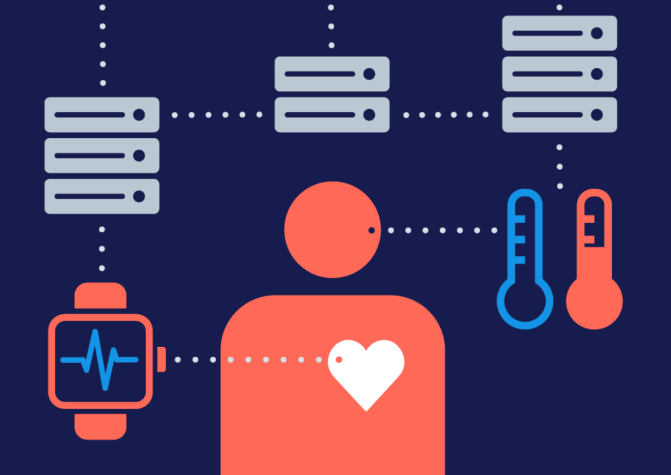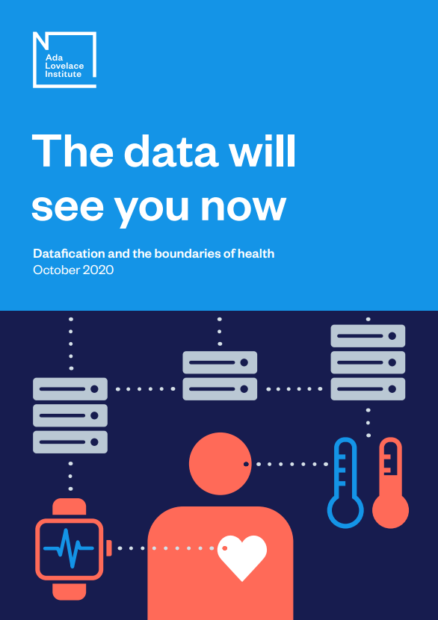Health datafication, digital phenotyping and the ‘Internet of Health’
A new report from the Ada Lovelace Institute explores the datafication of health, how it manifests and the consequences for people and society.
29 October 2020
Reading time: 4 minutes

From wearable tech and mobile apps to loyalty cards and online platforms, data gathered from almost every aspect of people’s digital lives increasingly reveals insights about their health.
The latest smartwatches offer step-counts and electrocardiograms, online search data can be used to infer dietary and physiological conditions, and the way a person interacts with their smartphone or behaves on social media can be proxies for their mental health status.
This is the ‘datafication’ of health, and it has profound consequences for who can access data about health, how we practically and legally define ‘health data’, and on our relationship with our own wellbeing and the healthcare system. Health information can now be inferred from non-health data, and data about health can be used for purposes beyond healthcare.
Until relatively recently, data about a person’s health was mainly recorded only in clinical settings: medical notes scribbled by a doctor or entered into a hospital system, findings from clinical trials designed to understand disease in a population or results from a test performed by a hospital lab. In these settings established ethical practices like patient-doctor confidentiality and medical regulations assured the integrity, security and privacy of that information.
But data about people’s health is no longer confined to medical records and clinical trials. Now, Big Data and Big Tech companies can piece together insights about people’s health from the data gleaned from their daily interactions with smart-devices and digital platforms.
These insights have benefits: they may be the foundation for major advances in our understanding of disease, and they can empower people to have more information and control over their own wellbeing. But datafication also enables granular predictions about people to be made based on health data, and offers tech companies even more extensive powers to influence people’s lives.
Data from various sources, health-related or not – like fitness tracking apps, advertising profiles, mapping tools – can come together to ‘hypernudge’ people’s behaviour: a runner might be notified that nearest protein-shake shop is just three minutes away. Or data-driven insights from across a network of online platforms – from social media to shopping – can be used in ‘digital phenotyping’ to make inferences about people’s physiological health. Those inferences could then be pooled into a credit score, without the customer’s awareness.
Datafication means health data is now ubiquitous: the array of networked devices that can record data about health occur across almost every aspect of people’s lives. Health data is also more comprehensive, able to record and reflect a full picture of a person in real time, all the time.
The ability to gather and use highly detailed data about specific individuals makes health data more personalised. And risk can be effectively calculated and scored thanks to the measurement-based nature of data about health, to the benefit of those with the data, not those who the data is about.
Where the bounds of what is and what counts as health data are stretched, so to are the bounds of how this data is defined legally, how its use is regulated and what is considered ethical when it comes to using it. Is it still meaningful to place health data into a ‘special category’ (as per the GDPR) if almost all personal data can be about health, and almost all data about health can be used for non-health purposes?
In our latest report, The data will see you now (157KB colour PDF), we explore the datafication of health: what it is, how it occurs and its consequences.
We draw on cases and examples to synthesise existing research, analyse concepts and surface the social and ethical challenges arising from the blurring of the boundaries of health data.
We put forward evidence that we all now live in an ‘Internet of Health’, where the ubiquitous collection and use of data about people’s health means everyone is always a patient, subject to continuous monitoring, diagnosis and prediction.
Looking forward, we pose a series of twelve questions that are raised by the consequences of the datafication of health, and what it means for the empowerment of people, equitable health outcomes, social solidarity and wellbeing, and inclusive health practices.
These questions highlight the considerable work needed to ensure the datafication of health works for people and society: developing legal definitions of health that account for datafication; ensuring inferences made about people’s health empower people instead of driving profit; maintaining the integrity that lies at the heart of healthcare while deploying the best data-driven tools.
Addressing these challenges requires turning attention and effort to understanding the datafication of health and its consequences. The questions, terms and concepts we identify aim to provide a foundation for future work by researchers, policymakers, technology developers and health professionals to achieve equitable and just models for health data and data about health that benefit everyone.
Related content

The data will see you now
Exploring the datafication of health: what it is, how it occurs, and its impacts on individual and social wellbeing